|
|
|
Sort Order |
|
|
|
Items / Page
|
|
|
|
|
|
|
| Srl | Item |
| 1 |
ID:
062152


|
|
|
|
|
| Publication |
New Delhi, Department of Personnel, 1971.
|
| Description |
26p.
|
| Series |
Training abstracts; 15
|
|
|
|
|
|
|
|
|
|
|
|
Copies: C:1/I:0,R:0,Q:0
Circulation
| Accession# | Call# | Current Location | Status | Policy | Location |
| 006476 | 351.1/SIV 006476 | Main | On Shelf | General | |
|
|
|
|
| 2 |
ID:
126333


|
|
|
|
|
| Publication |
2013.
|
| Summary/Abstract |
Nikita Khrushchev and Nikolai Bulganin's visit to Britain in April 1956 was the first by the new Soviet leadership to a Western bloc country after Josef Stalin's death. It presented British policy-makers with a unique opportunity for insight and discussion. However, British self-deception regarding their scope for independent action as well as excessive focus on events in the Middle East hampered efforts to build a rapport with Khrushchev and Bulganin. This analysis explores the planning and conduct of what turned out to be a fruitless diplomatic initiative. The visit illustrates British and Soviet policy at the time, as well as Britain's already clear position as the junior partner in the Anglo-American "special relationship" on the eve of Suez.
|
|
|
|
|
|
|
|
|
|
|
|
|
|
|
|
| 3 |
ID:
126733
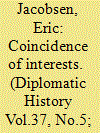

|
|
|
|
|
| Publication |
2013.
|
| Summary/Abstract |
This article will demonstrate that in 1963 the administration of President Kennedy helped create a Ba'th regime in Iraq and then provided it with assistance in order to secure U.S. interests, including access to oil and the containment of both Communism and Arab nationalism. On February 8, 1963, the Ba'th overthrew the dictatorship of General 'Abd-ul-Karim Qasim, an Iraqi nationalist who was seen by both the Eisenhower and Kennedy administrations as a threat to U.S. interests. U.S. policy makers provided the Ba'th regime with military and economic assistance, including sales of military equipment, credits for agricultural surpluses for credit under Public Law 480, and Export-Import Bank loans. Policy makers also encouraged private U.S. businesses to sign contracts with Iraq, supplied the Ba'th regime with ammunition to use against Kurdish rebels, used the Central Intelligence Agency to provide it military equipment, and ignored the Export-Import Bank's policy that prohibited financing arms sales.
|
|
|
|
|
|
|
|
|
|
|
|
|
|
|
|
| 4 |
ID:
124371
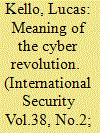

|
|
|
|
|
| Publication |
2013.
|
| Summary/Abstract |
Security policy in the information age faces formidable challenges. Chief among these is to evaluate correctly the impact of cyberweapons on strategy: Does the new technology require
a revolution in how scholars and policymakers think about force and conºict?1 Practitioners confront a predicament in addressing this question: the cyber revolution gives rise to novel threats and opportunities requiring immediate policy responses; yet understanding its nature and its consequences for security is a slow learning process. Interpretation of cyber phenomena involves analysis of a new body of experience that existing theories may be unable to clarify. It presupposes, moreover, a technical understanding of a transforming technology, whose implications require time to master because of its scientific complexity.
|
|
|
|
|
|
|
|
|
|
|
|
|
|
|
|
| 5 |
ID:
127303
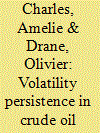

|
|
|
|
|
| Publication |
2014.
|
| Summary/Abstract |
Financial market participants and policy-makers can benefit from a better understanding of how shocks can affect volatility over time. This study assesses the impact of structural changes and outliers on volatility persistence of three crude oil markets - Brent, West Texas Intermediate (WTI) and Organization of Petroleum Exporting Countries (OPEC) - between January 2, 1985 and June 17, 2011. We identify outliers using a new semi-parametric test based on conditional heteroscedasticity models. These large shocks can be associated with particular event patterns, such as the invasion of Kuwait by Iraq, the Operation Desert Storm, the Operation Desert Fox, and the Global Financial Crisis as well as OPEC announcements on production reduction or US announcements on crude inventories. We show that outliers can bias (i) the estimates of the parameters of the equation governing volatility dynamics; (ii) the regularity and non-negativity conditions of GARCH-type models (GARCH, IGARCH, FIGARCH and HYGARCH); and (iii) the detection of structural breaks in volatility, and thus the estimation of the persistence of the volatility. Therefore, taking into account the outliers on the volatility modelling process may improve the understanding of volatility in crude oil markets.
|
|
|
|
|
|
|
|
|
|
|
|
|
|
|
|
| 6 |
ID:
133642
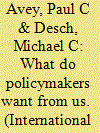

|
|
|
|
|
| Publication |
2014.
|
| Summary/Abstract |
What do the most senior national security policymakers want from international relations scholars? To answer that question, we administered a unique survey to current and former policymakers to gauge when and how they use academic social science to inform national security decision making. We find that policymakers do regularly follow academic social science research and scholarship on national security affairs, hoping to draw upon its substantive expertise. But our results call into question the direct relevance to policymakers of the most scientific approaches to international relations. And they at best seriously qualify the "trickle down" theory that basic social science research eventually influences policymakers. To be clear, we are not arguing that policymakers never find scholarship based upon the cutting-edge research techniques of social science useful. But policymakers often find contemporary scholarship less-than-helpful when it employs such methods across the board, for their own sake, and without a clear sense of how such scholarship will contribute to policymaking.
|
|
|
|
|
|
|
|
|
|
|
|
|
|
|
|
| 7 |
ID:
139150
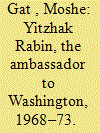

|
|
|
|
|
| Summary/Abstract |
Rabin differed considerably from the average ambassador – a representative receiving and issuing reports. He viewed himself not only as a diplomat, but as capable of shaping policy with respect to both the Arab–Israeli conflict and the relationship with the United States. During his term as ambassador to Washington he displayed sober realism with regard to the political, and to some extent the military, reality – the very realism that was absent from the government that sent him.
|
|
|
|
|
|
|
|
|
|
|
|
|
|
|
|
|
|
|
|
|